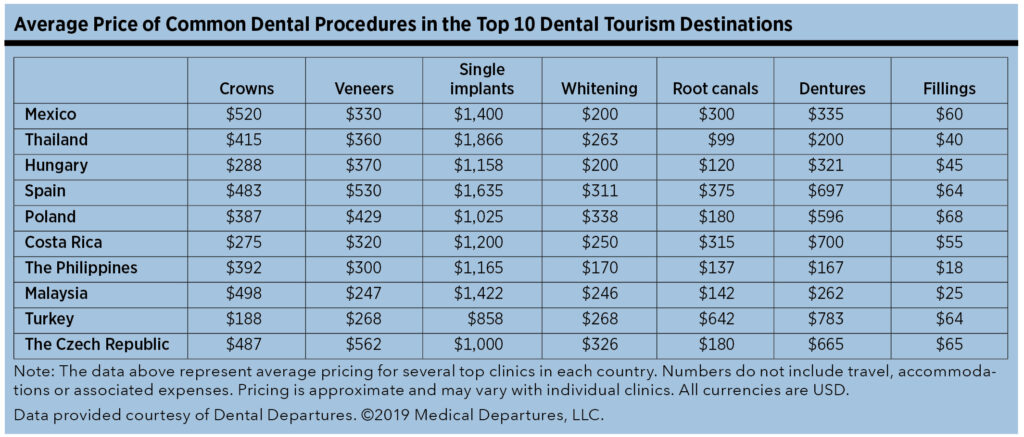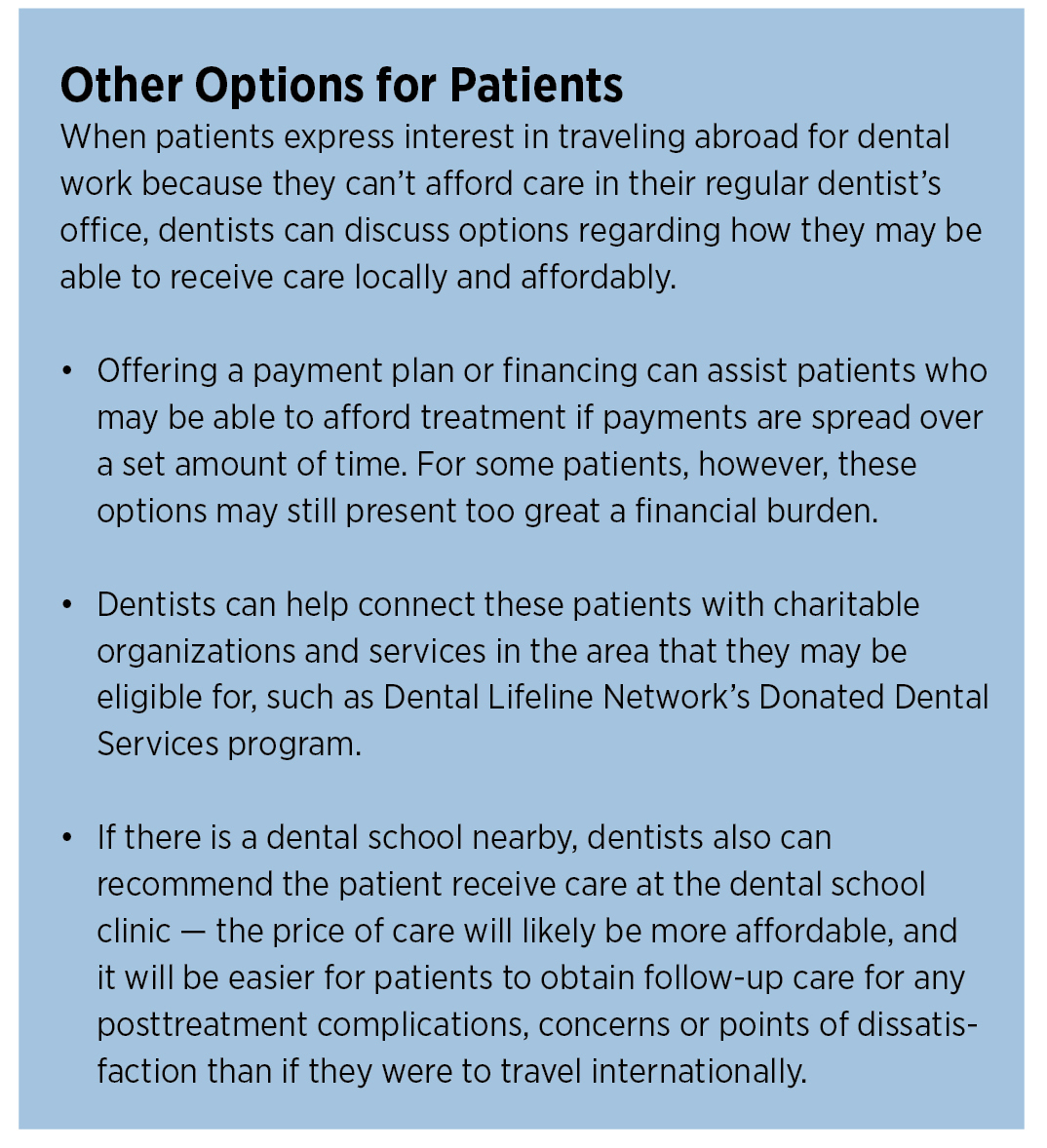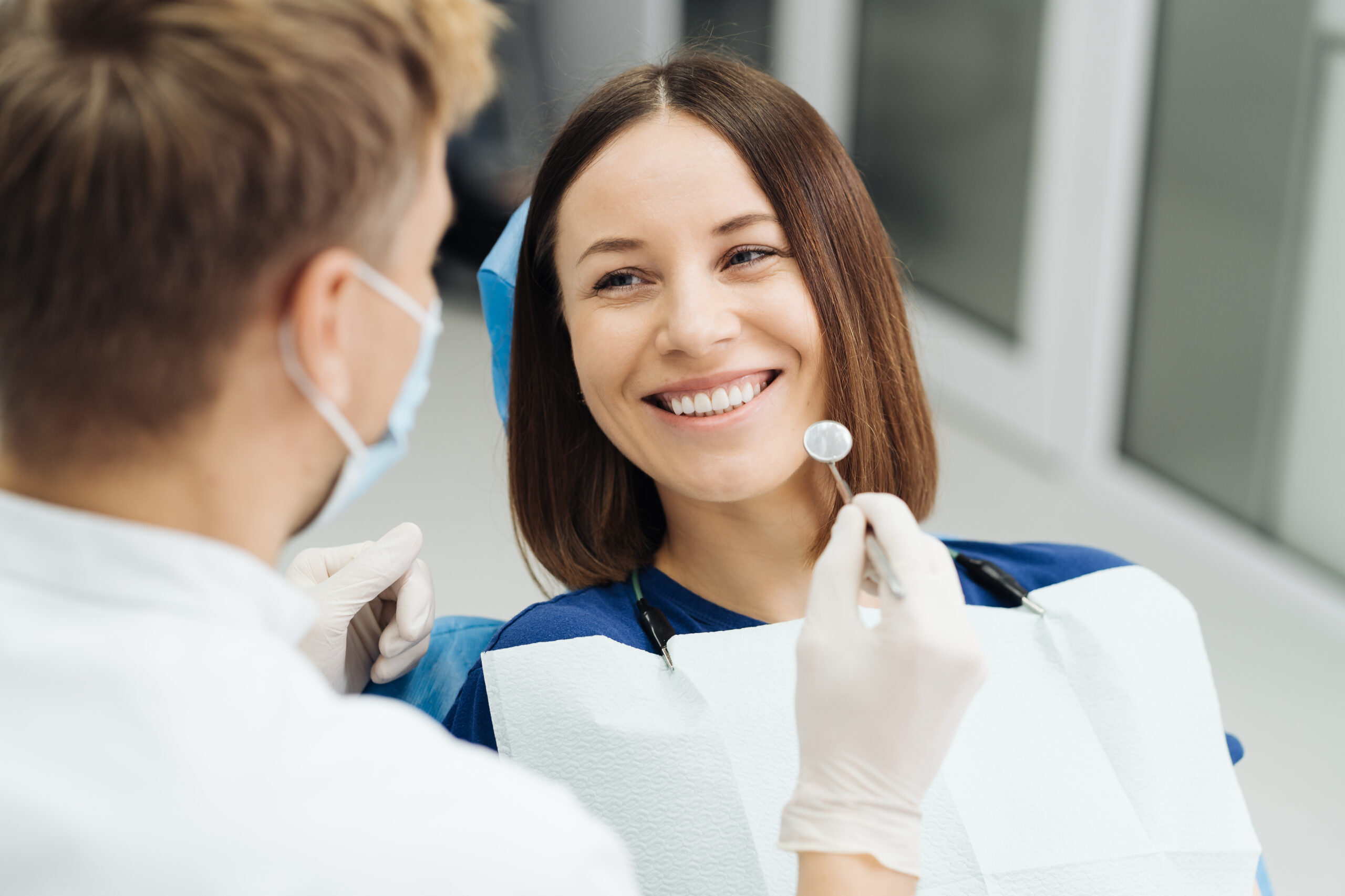Are you considering dental tourism for your next dental procedure? It’s a cost-effective and popular option for many individuals seeking high-quality dental care at affordable prices. However, it’s important to remember that after your dental treatment abroad, proper follow-up care is essential to ensure the success and longevity of your dental work. In this article, we will provide you with some useful guidelines for post-treatment care after your dental tourism experience. From ensuring proper healing and minimizing complications to maintaining good oral hygiene, we’ve got you covered. So let’s dive in and find out how you can make the most out of your dental tourism journey by taking care of your teeth long after you return home.
Table of Contents
TogglePreparation before Dental Tourism
When considering dental tourism, it’s crucial to be prepared before embarking on your journey to a foreign destination for dental treatment. This preparation includes various steps to ensure a smooth and successful experience.
Researching dental tourism destinations
The first step in preparing for dental tourism is to research potential destinations. Look for countries that are known for their reputable dental clinics and quality healthcare services. Consider factors such as the cost of treatment, the reputation of dental professionals, and the overall safety and accessibility of the destination.
Choosing a reputable dental clinic
Once you have selected a dental tourism destination, it’s vital to choose a reputable dental clinic. Look for clinics that have positive reviews, certifications, and experienced dentists. You can also seek recommendations from friends, family, or online dental communities who may have had prior experience with dental tourism.
Consultation with the dentist before travel
Before committing to dental tourism, it’s essential to have a consultation with the dentist remotely. This consultation allows you to discuss your dental concerns, expectations, and treatment options. Through this initial exchange, you can establish trust and ensure that the recommended treatment aligns with your objectives.
Medical and dental history gathering
To ensure the dentist has a complete understanding of your dental health, gather your medical and dental history. Share any relevant information such as past treatments, allergies, or chronic conditions. This information will help the dentist create a personalized treatment plan and minimize any risks or complications during your dental treatment.
Understanding the process and treatment plan
Make sure you thoroughly understand the dental treatment process and the proposed treatment plan. Ask your dentist to explain the procedures, timelines, and potential risks or side effects associated with the treatment. This understanding will help you make an informed decision and be prepared for what to expect during your dental tourism experience.
Preparing necessary documents and records
Before traveling for dental treatment, gather all the necessary documents and records. This includes your passport, visa, dental x-rays, previous dental records, and any other relevant medical documentation. Having these documents readily available will facilitate smooth communication with the dental clinic and ensure seamless continuity of care.
Travel and Arrivals
Booking flights and accommodations
Once you have finalized your dental treatment plan, it’s time to book your flights and accommodations. Look for affordable and convenient travel options, keeping in mind the duration of your treatment and the recovery period. It’s advisable to arrive a day or two before your initial consultation to allow yourself time to rest and acclimatize to the new surroundings.
Understanding local customs and culture
To ensure a pleasant experience, take some time to understand the local customs and culture of your dental tourism destination. Learn about the appropriate etiquette, dress code, and any cultural practices that may be different from your own. Respecting the local customs will help you integrate better and create a positive rapport with the locals.
Transportation arrangements
Make transportation arrangements for your stay in the dental tourism destination. Identify the most convenient and reliable methods of transportation, whether it’s public transportation, taxis, or ride-sharing services. Plan ahead to ensure you can easily navigate between your accommodations and the dental clinic without any hassle.
Arriving at the destination
Upon arrival, take some time to settle into your accommodations and familiarize yourself with the surroundings. If necessary, visit the dental clinic in advance to ensure you know the route and avoid any last-minute confusion. Give yourself ample time to adjust to the new environment and rest before your initial consultation.
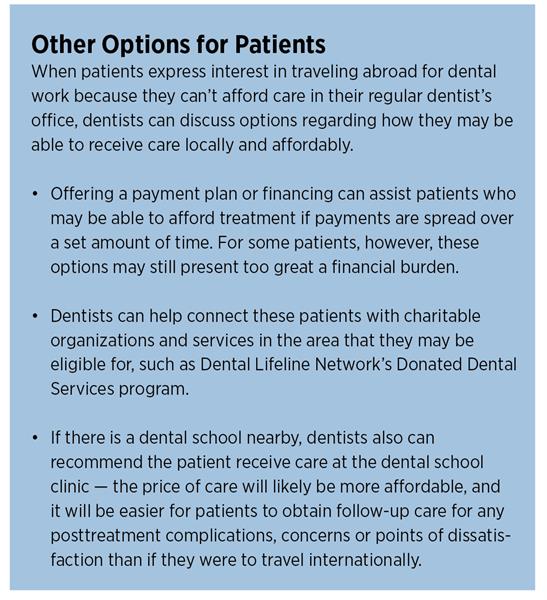
Dental Treatment Process
Initial consultation and examination
During your initial consultation and examination at the dental clinic, the dentist will review your dental history, conduct a thorough examination, and discuss the treatment plan in detail. This consultation serves as an opportunity for you to ask any questions or address any concerns you may have. Be open and honest with the dentist about your expectations and any apprehensions you may be feeling.
Treatment procedures and timeline
Once the treatment plan is finalized, the dentist will schedule the necessary treatment procedures. This may include dental cleanings, fillings, root canals, extractions, or even more extensive procedures such as dental implants or smile makeovers. The timeline for these procedures will depend on the complexity of the treatment and the individual’s healing process.
Types of anesthesia and sedation
During dental treatments, various types of anesthesia and sedation may be used to ensure patient comfort. The dentist will discuss the available options and help you choose the most suitable method for your specific procedure and comfort level. It’s important to communicate any concerns or allergies to medications to the dentist beforehand.
Post-treatment instructions
After each dental procedure, the dentist will provide you with post-treatment instructions to promote proper healing and minimize any potential complications. These instructions may include specific guidelines for oral hygiene practices, dietary restrictions, and recommendations for pain management. It’s crucial to carefully follow these instructions to optimize your recovery process.
Ensuring proper communication with the dentist
Throughout your dental treatment, it’s important to maintain open and clear communication with your dentist. If you experience any discomfort, unusual symptoms, or have questions or concerns, don’t hesitate to reach out to the dental clinic. Promptly addressing any issues will ensure that you receive the appropriate care and guidance to resolve them effectively.
Importance of Follow-up Care
Understanding the need for post-treatment care
After completing your dental treatment abroad, follow-up care is essential to monitor your healing progress and ensure the longevity of your dental work. Proper post-treatment care plays a crucial role in minimizing the risk of complications and maintaining optimal oral health.
Avoiding complications and risks
Following the recommended post-treatment care guidelines significantly reduces the risk of complications. By diligently adhering to the dentist’s instructions and attending follow-up appointments, you can address any potential issues early on and prevent them from developing into more significant problems.
Maintaining oral hygiene
Maintaining good oral hygiene is vital for the success of your dental treatment. This includes brushing your teeth at least twice a day, flossing daily, and using mouthwash as recommended. Proper oral hygiene practices will help prevent tooth decay, gum disease, and other oral health issues.
Monitoring healing process
Keeping a close eye on the healing process is crucial. Take note of any subtle changes or symptoms that may arise, such as prolonged bleeding, swelling, or persistent pain. Promptly report any unusual symptoms to your dentist to ensure timely intervention if necessary.
Managing discomfort or pain
It’s common to experience some discomfort or pain after dental treatment. Follow the instructions provided by your dentist for pain management, which may include taking prescribed medications, applying cold compresses, or using over-the-counter pain relievers. If the pain persists or worsens, consult with your dentist for further evaluation.
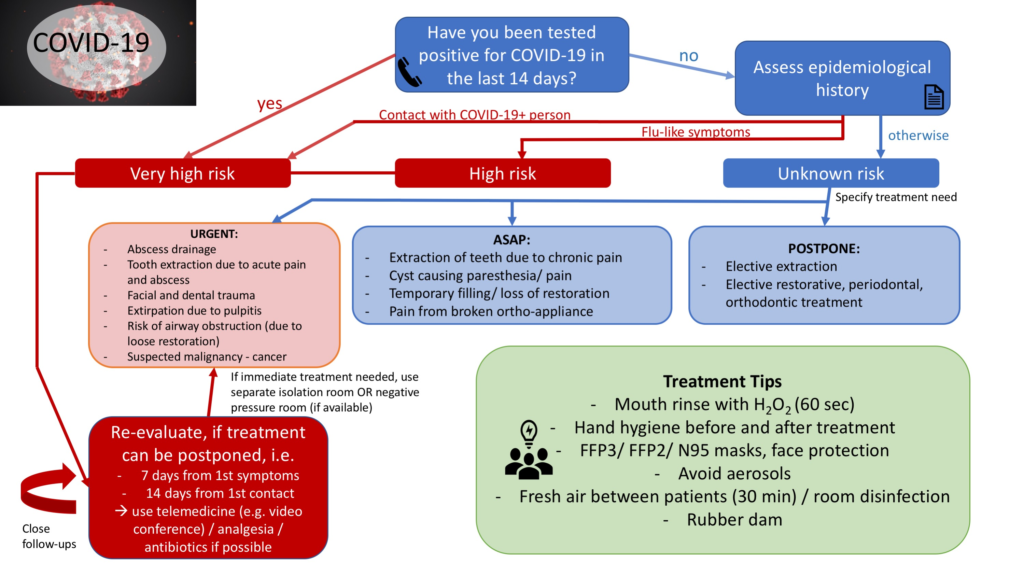
Post-Treatment Care Guidelines
Follow the dentist’s instructions
Upon completing your dental treatment, carefully follow the post-treatment care instructions provided by your dentist. These instructions may include specific guidelines on oral hygiene practices, dietary restrictions, and recommended follow-up appointments. Adhering to these instructions will facilitate optimal healing and ensure the success of your dental treatment.
Take prescribed medications as directed
If your dentist has prescribed medications, take them as directed. This may include antibiotics to prevent infection or pain medication to manage any discomfort. Follow the prescribed dosage and duration to ensure the medications effectively support your healing process.
Bleeding and swelling management
After dental treatment, it’s common to experience some bleeding and swelling. To manage these symptoms, apply gentle pressure to any bleeding areas with clean gauze or a damp tea bag. Use cold compresses on your face to reduce swelling. If bleeding or swelling persists or worsens, contact your dentist for further guidance.
Oral hygiene practices
Maintaining proper oral hygiene is crucial during the post-treatment period. Brush your teeth gently using a soft-bristled toothbrush and fluoride toothpaste. Be mindful of the treated area and avoid vigorous rinsing or spitting. Follow any specific guidelines provided by your dentist to ensure optimal healing.
Dietary restrictions and recommendations
Your dentist may provide dietary restrictions or recommendations to follow after dental treatment. Avoid consuming hot or spicy foods, hard or sticky candies, and crunchy or chewy foods that may damage the treated area. Stick to softer foods, such as soups, mashed potatoes, and smoothies, for a few days or as advised by your dentist.
Avoiding strenuous activities
Engaging in strenuous activities, such as intense exercise or heavy lifting, can interfere with the healing process. Avoid such activities for the recommended duration specified by your dentist. Give your body ample time to recover and focus on activities that promote relaxation and overall well-being.
Smoking and alcohol cessation
Smoking and alcohol consumption can delay the healing process and increase the risk of complications, such as infection or poor wound healing. It’s crucial to refrain from smoking and limit alcohol consumption during the post-treatment period. Follow your dentist’s recommendations to optimize your healing and ensure the success of your dental treatment.
Monitoring any unusual symptoms or complications
Throughout the post-treatment period, monitor your oral health and wellbeing closely. Pay attention to any unusual symptoms, such as severe pain, excessive bleeding, or signs of infection, such as fever or swelling. If you notice any concerning changes, promptly contact your dentist to seek professional help and guidance.
Preventing Infections and Complications
Maintaining oral hygiene
Maintaining good oral hygiene is one of the most effective ways to prevent infections and complications. Brush your teeth at least twice a day, floss daily, and use mouthwash as recommended by your dentist. Regularly remove plaque and bacteria from your teeth and gums to minimize the risk of infection.
Rinsing with prescribed mouthwash
Your dentist may prescribe a specific mouthwash to use during your post-treatment period. Follow the instructions provided and rinse your mouth as directed. This mouthwash may help reduce the risk of infection and promote healing in the treated area.
Avoiding smoking and alcohol
Smoking and alcohol can increase the risk of infections and hinder the healing process. It’s essential to avoid smoking and limit alcohol consumption, as advised by your dentist. Maintaining a healthy lifestyle can optimize your healing and ensure the long-term success of your dental treatment.
Using antibiotics as prescribed
If your dentist prescribes antibiotics, take them as directed and complete the full course of medication. Antibiotics help prevent or treat infections that may arise after dental treatment. Follow your dentist’s instructions and contact them if you experience any adverse reactions or have questions.
Recognizing signs of infection
It’s important to recognize the signs of infection and seek professional help if you suspect an infection. Symptoms of an infection may include persistent pain, swelling, fever, redness, or discharge. If you experience any of these symptoms, contact your dentist immediately for a thorough evaluation and appropriate treatment.
Seeking professional help when needed
If you have any concerns or notice any complications, don’t hesitate to seek professional help from your dentist. Prompt intervention can prevent minor issues from escalating into more significant problems. Your dentist is your best resource for expert advice and guidance throughout your dental tourism experience.
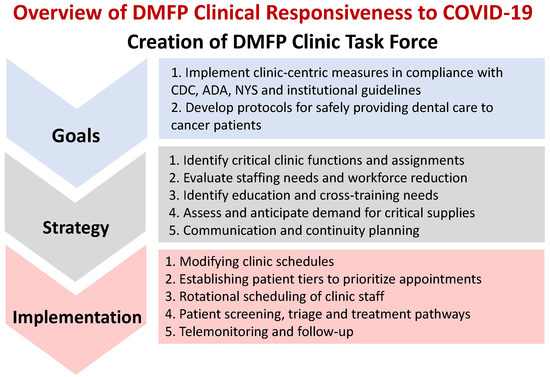
Monitoring Healing and Recovery
Paying attention to symptoms and changes
During the post-treatment period, it’s crucial to pay close attention to any symptoms or changes in your oral health. Be aware of any persistent pain, swelling, bleeding, or unusual sensations. Regularly assess the treated area in the mirror and consult with your dentist if you notice anything concerning.
Regular dental check-ups
Regular dental check-ups are essential for monitoring your healing and ensuring the long-term success of your dental treatment. Schedule follow-up appointments as recommended by your dentist. These check-ups allow your dentist to assess your oral health, address any concerns, and provide preventive care to maintain optimal oral hygiene.
X-rays and other diagnostic tests
Your dentist may request x-rays or other diagnostic tests during the follow-up appointments to evaluate your healing progress. These tests provide valuable insights into the condition of your teeth and surrounding tissues. Follow your dentist’s recommendations and cooperate fully with any necessary diagnostic procedures.
Addressing any concerns with the dentist
If you have any concerns, questions, or uncertainties during your healing process, don’t hesitate to address them with your dentist. Clear communication is crucial in ensuring that your healing is progressing as expected. Your dentist will provide you with the necessary guidance and reassurance throughout your recovery journey.
Planning for long-term dental care
As you near the completion of your healing process, discuss long-term dental care plans with your dentist. Determine the frequency of regular check-ups and cleanings, and learn about any additional treatments or procedures that may be beneficial for maintaining your oral health in the long run. Collaborate with your dentist to develop a personalized dental care plan that suits your needs.
Communication with the Dentist
Availability and methods of contacting the dentist
Establish clear communication channels with your dentist to address any questions or concerns during your dental tourism experience. Ask about their availability and preferred methods of contact, such as email or phone. Having reliable communication will enable you to seek guidance promptly and ensure a smooth dental treatment journey.
Language barriers and translation services
If language barriers exist between you and the dental team in your chosen destination, inquire about translation services provided by the clinic. Many dental clinics catering to international patients employ staff who speak multiple languages to facilitate effective communication. Utilize translation services if needed to ensure you can fully understand and communicate with your dentist.
Seeking clarification and additional information
During consultations or follow-up appointments, don’t hesitate to seek clarification or request additional information from your dentist. Ask questions about your treatment plan, post-treatment care, and any concerns that may arise. A well-informed patient is better equipped to make decisions and actively participate in their oral healthcare journey.
Reporting any post-treatment issues
If you experience any post-treatment issues or complications, report them to your dentist promptly. Whether it’s persistent pain, swelling, or any other concerning symptoms, inform your dentist as soon as possible. Timely reporting allows your dentist to evaluate the situation and provide appropriate guidance for managing the issue effectively.
Seeking guidance on oral hygiene and care products
Ask your dentist for recommendations on oral hygiene products tailored to your specific needs. Inquire about toothpaste, mouthwash, or dental appliances that may enhance your oral health. Your dentist can provide valuable guidance on the most suitable products to maintain your dental treatment’s longevity and overall oral health.
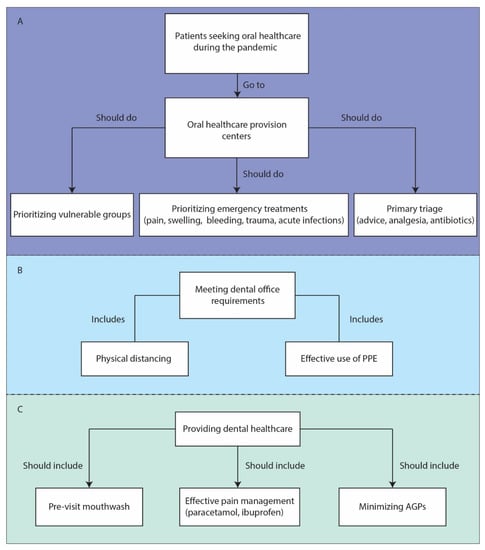
Potential Risks and Complications
Infection
Infections are potential risks after dental treatment. Follow the prescribed post-treatment care guidelines to minimize the risk of infection. Maintain good oral hygiene, rinse with prescribed mouthwash, avoid smoking and alcohol, and seek immediate professional help if you suspect an infection.
Tooth sensitivity
Tooth sensitivity is a common side effect after certain dental procedures, such as teeth whitening or the placement of dental crowns. It typically subsides within a few days or weeks. Use desensitizing toothpaste as recommended by your dentist and avoid consuming hot or cold foods until the sensitivity diminishes.
Swelling and discomfort
Swelling and discomfort are common after dental treatments, particularly surgical procedures. Follow post-treatment care instructions, apply cold compresses to the face, take prescribed pain medication if needed, and rest adequately to reduce swelling and discomfort. If the swelling or discomfort persists or worsens, consult your dentist for further evaluation.
Gum irritation
Gum irritation may occur after dental procedures involving the gums, such as periodontal treatment or dental implant placement. Follow the post-treatment care guidelines provided by your dentist, maintain good oral hygiene, and avoid touching or irritating the treated gum area. If gum irritation persists or becomes severe, contact your dentist for assessment and advice.
Nerve damage
While rare, nerve damage can occur during dental procedures, particularly those involving tooth extractions or dental implants. The risk varies depending on the complexity of the treatment and individual factors. Discuss the risk of nerve damage with your dentist before the procedure and report any persistent numbness or tingling sensations to your dentist for further evaluation.
Bite adjustment issues
After certain dental treatments, such as the placement of dental crowns or veneers, there may be a need for bite adjustment. If you experience discomfort or difficulties with your bite, contact your dentist for evaluation and possible adjustment. A properly aligned bite ensures the longevity and functionality of your dental restorations.
When to Seek Professional Help
Excessive bleeding
Excessive or prolonged bleeding after dental treatment is not normal. If bleeding persists or intensifies despite applying pressure, contact your dentist immediately. Excessive bleeding may indicate a complication or other underlying issues that require immediate professional intervention.
Severe pain or swelling
Severe or worsening pain or swelling after dental treatment should not be ignored. Contact your dentist promptly to seek professional evaluation and guidance. These symptoms may indicate infection, complications, or other issues that need timely intervention.
Fever or signs of infection
A fever or signs of infection, such as increased pain, swelling, redness, or discharge, should not be ignored. These are potential indicators of an infection that requires immediate attention. Contact your dentist as soon as possible to receive appropriate treatment and prevent the infection from spreading.
Persistent numbness or tingling
If you experience persistent numbness or tingling in the treated area, it may indicate nerve damage or compression. This occurrence warrants immediate professional evaluation. Inform your dentist promptly to assess the situation and determine the appropriate course of action.
Problems with dental restorations
If you encounter any issues or problems with your dental restorations, such as loose crowns, broken fillings, or difficulties with dentures or implants, contact your dentist promptly. Prompt assessment and repair can ensure the longevity and functionality of your dental restorations.
In conclusion, dental tourism can be a rewarding experience for individuals seeking high-quality dental treatment at an affordable cost. However, it’s crucial to be well-prepared before embarking on this journey. Thorough research, careful planning, and effective communication with your dentist are essential for a successful dental tourism experience. Additionally, following the recommended post-treatment care guidelines, monitoring your healing process, and promptly seeking professional help when needed will ensure optimal oral health and the long-term success of your dental treatment.
